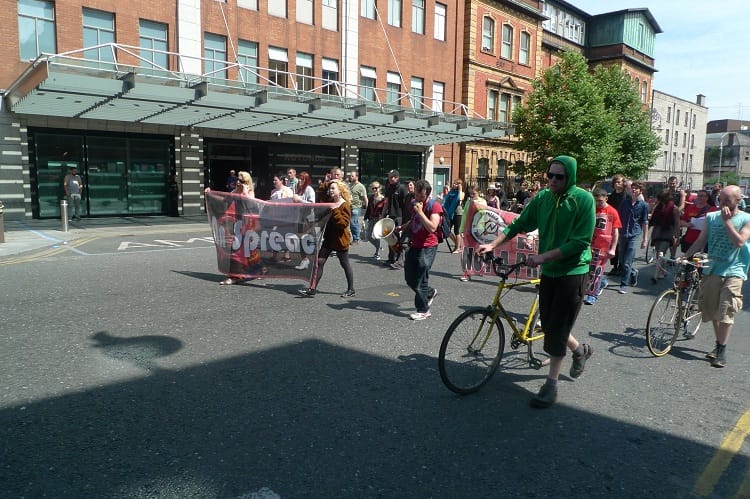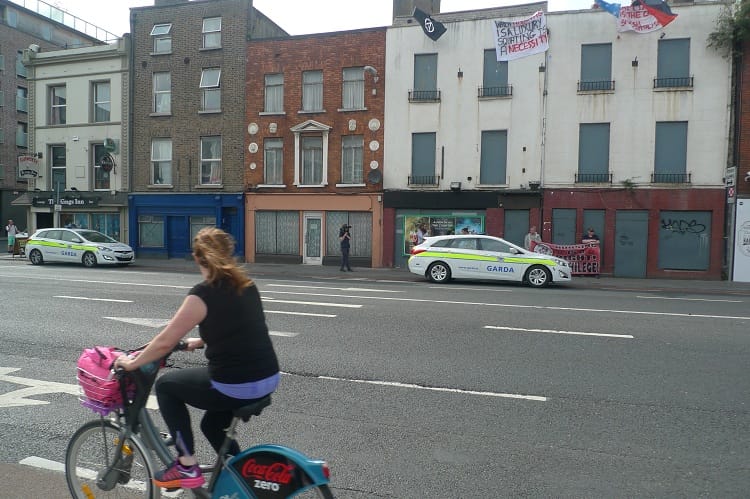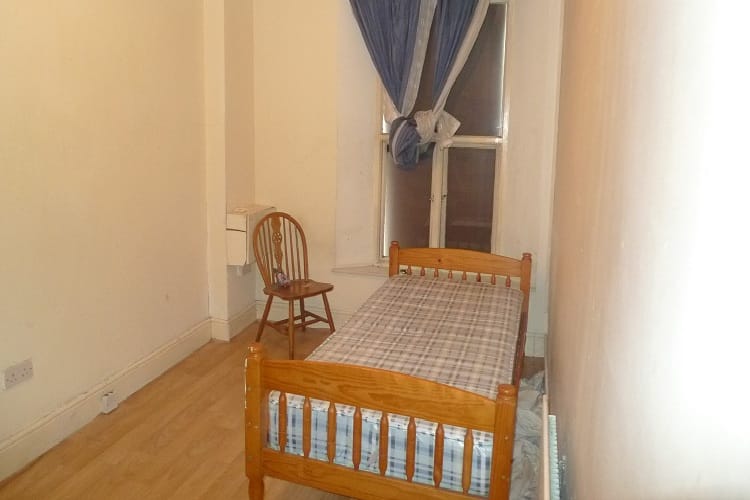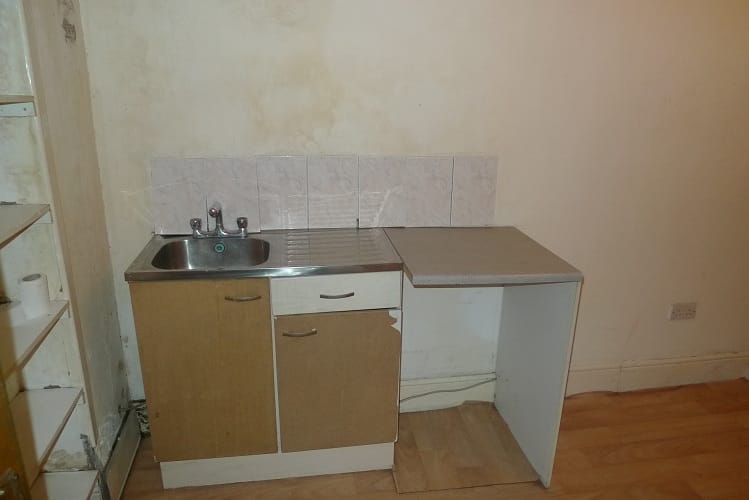What’s the best way to tell area residents about plans for a new asylum shelter nearby?
The government should tell communities directly about plans for new asylum shelters, some activists and politicians say.
In recent weeks, housing activists in Dublin squatted a council building to house homeless families. Could it be the start of an unlikely alliance?

Three weeks ago, a group of homelessness organisations spearheaded by An Spreach, a left-wing organisation that advocates “direct action and civil disobedience” as a means of highlighting and tackling the current housing crisis, took possession of an abandoned Dublin City Council building on Bolton Street.
Since then, they’ve been fixing the place up, getting it ready for its intended purpose: housing homeless families in need of emergency accommodation. In fact, this is what it was previously used for until Dublin City Council closed it down three years ago.
It was deemed “not fit for purpose”, so it needed to be upgraded, and the local authority has been considering plans for this, said Lisa Kelleher, communications head for the Dublin Regional Homeless Executive, in an email.
While city council has been mulling over what to do with the building, housing activists have put their plans in motion. Soon, the first families will move in. Now that the landscape has changed, what will the council do about the squat?
The homeless organisations behind the takeover haven’t been quiet about it.
On Friday 3 July, a clear blue afternoon, a crowd of about 40 people, as well as a couple of non-affiliated supporters, gather outside the General Post Office on O’Connell Street.
From here, they plan to march to the occupied property on Bolton Street, now called the Bolt Hostel. Activists hold An Spreach banners, as well as banners that proclaim: “Housing is a Right! Not a Privilege!” Others pass out flyers that detail the direct action being taken and the reasons behind it.
Gina, one of the women handing out the flyers, is the mother of Tony, a volunteer from An Spreach. It’s a touchingly Irish thing to have the mother of a radical activist out supporting his cause.
She says that when An Spreach launched last year, there were only a handful of people involved. Now, it is a crucial part in the fabric of the DIY fight against homelessness, which stretches across nine separate organisations.
The “reclaiming” of the Dublin City Council building comes on the back of several forms of direct action orchestrated by An Spreach et al over the past year, which include the removal of anti-homeless devices that prevent homeless people from sleeping in office doorways, and a number of sit-in protests at city council offices.
The occupation of this vacant building can be viewed as their most ambitious push to date. One of the women at the protest – she is short, with dark hair and a dayglo top –says people are being left with no alternative. She has four children, the eldest of whom is 15, and has been on the housing list for fifteen years.
She was living in private rented accommodation up until three years ago, when her landlord decided to sell the property. Unable to find other accommodation at an affordable rent, she moved in with her mother but had to move back out, she says, because the house was overcrowded according to the council.
Since then, she’s been staying with friends, neighbours, and cousins. “I’ve overstayed me welcome,” she says. “I need a house. I need a stable home for my children.”
Also out on O’Connell Street Friday is Seamus Farrell of the Irish Housing Network. “The doors at the top level are being shut off to us now,” he says. “Neither the council or the government are going to open up the vacant, unused buildings, so we are.”

After forty minutes of activists handing out flyers and talking to anyone walking by who is willing to listen, the march is about to get underway. First, a statement is read out by a very tall, confident young man with a loudspeaker.
“’Housing is a right’ are empty words in this society,” he begins. “We have reclaimed an abandoned homeless hostel, which Dublin City Council has left to rot for three years, in order to house families in need of emergency accommodation – its rightful purpose . . . Decent housing for all is very possible.”
He goes on to say that “302,000 empty housing units and over 90,000 on social housing list . . . This is the absurd and cruel mathematics of capitalism . . . only ‘ordinary’ people banding together and taking direct action can make a better world, and only when we move past this antiquated social system will we be free. Until then, until a society where each person gives according to their ability and receives according to need, we say, ‘Rob the robbers! Take what you need now!’”
A roaring cheer goes up, and soon the crowd of protesters moves onto O’Connell Street, heading in the direction of Parnell Street.
Just a few days later, at the monthly Dublin City Council meeting on Monday, the council’s housing chief, Dick Brady, told councillors that, despite their many efforts, his team was struggling to keep up with the growing numbers of homeless.
He also revealed that the council faced a projected budget shortfall of €18.5 million in funding for homeless services. They’d asked for €55 million and been given €37 million. City councillors have called for more funding to be released, and there are ongoing discussions with Department of Environment.
At the moment, though, the Department of Environment appears to be playing hardball and said that the request for €55 million for Dublin’s homelessness services was “never realistic”.
“For this year, Dublin City Council sought a homelessness allocation of €55 million at a time when they already knew that the national allocation was €55 million,” said the Department of Environment in an email. “If their request had been acceded to, no other city, town or county would have received any allocation. That was clearly not a tenable option.”
It’s not like Dublin City Council officials are twiddling thumbs and enjoying the patchy summer; they have taken steps to pull more housing on stream.
In the meeting, Brady listed them: it plans to acquire 100 more units for homeless families; it is trying to bring 150 Housing Assistance Payment (HAP) units into being; and it has had an intensive leasing campaign.
But “the numbers are increasing at such a rate that those actions, if you like, will not see a downturn in relation to the number of homeless families coming to seek our service,” Brady added.
Later in the meeting, following a query from People Before Profit Councillor John Lyons, Brady also said that the city council has run out of money to refurbish “voids” or vacant local authority homes. So far this year, they’ve done 460 units, he said, and are working on another 230 units at the moment.
Their 2015 budget for this was a little over €7 million: €4.3 million from the Department of Environment to refurbish 234 units, and €3 million that the council had set aside itself. But they’ve spent around €8 million on the 460 units and are looking at another €4 million on the 230 units that are in process. In other words, they’ve overspent.
“Because we were heading into overspend, as a prudent measure, we’ve stopped new voids coming in to the system whilst we’re talking with the Department [of Environment] in relation to an additional or increased allocation,” Brady said.
All this raises a question: with the council strapped for cash, properties (some local-authority-owned) sitting abandoned in the city, and growing number of homeless people, are the Bolton Street squatters on to something?
On Friday, led by those holding up the banners, the marchers block the road and force the traffic behind them to slow to a crawl. Not one horn is barped to hurry them along.
Chants cry out from the loudspeaker as it passes around the activists and are echoed by the marchers: “Housing is a human right!/ This is why we have to fight!” “What do we want?/ More houses!/ When do we want them?/ Now!”
People along the crowded western path of O’Connell Street look on, and hold up their phones for photos and videos of the march. Taxi drivers waiting on the rank at the north end beep in support. A grubby-looking inebriated man with a can in his hand shouts at the marchers, “What about the homeless?”
The march swings left onto Parnell Street and then right up Parnell Square West onto Granby Row, where it turns left for Bolton Street. The traffic behind is patient.
The chants continue: “Whose city?/ Our city!/ Whose houses?/ Our houses!”
I get talking to one of the marchers, an older bald man in a cream corduroy coat too heavy for such a warm afternoon. He’s not affiliated with any of the groups, he says, he’s just here in support. I ask him about the legality of this type of direct action; he has the look of a solicitor.
He’s not, but tells me that the occupation is not a criminal matter but a civil one, as long as no other public order offences are committed. (Later, I confirm that with a real solicitor.)
Squatting is often tangled up with adverse possession, but they’re different. Squatting is about using an empty property with no claims of property rights; adverse possession is about claiming ownership of property which you have occupied for a prolonged period of time – here in Ireland, 12 years – without action from the owner to remove the you.
Ireland looks more favourably on squatting and adverse possession than parts of the UK. Over the waters in England and Wales, squatting in residential buildings was criminalised in 2012 and adverse possession was curtailed a decade earlier.
But “Ireland has not gone down this road, and the long-established rules about adverse possession remain in place,” explains Lorna Fox O’Mahony, a professor at Essex Law School and the author of several books on squatting and adverse possession, including Moral Rhetoric and the Criminalisation of Squatting: Vulnerable Demons?.
Ireland’s more liberal stance is a recognition that land is a valuable, limited resource. There is an ethical case for efficient use of land, and against allowing land, or housing, to lie fallow, she said.
Back on Bolton Street, there’s a welcoming party to greet the marchers: five people on the roof of the occupied building, masked in scarves and balaclavas. Anarchist flags reach out from the roof over the street and banners draped down the front of the building read: “Capitalism Is the Crisis. Smash Capitalism” and “When Housing is a Luxury, Squatting Is a Necessity”.
There’s an argument that you sometimes hear in relation to squatters, that they’re flouting social norms and getting something for nothing.
“The problem with this argument is that it is based on a very particular, and often false, stereotype of the squatter,”says Fox O’Mahony. “In truth, the squatting community is complex, and not well understood.”
People squat for a variety of reasons. Some squatting is ideological: against the system of private property, or, in protest, for example, against issues of inequality, austerity, or failures of local authorities to effectively discharge their responsibilities to deliver adequate housing. Some squatting is driven by need: because people are homeless, and need somewhere to go.
“The problem with the demonisation of squatters, is that it paints a picture in black and white, which is true of only a (perhaps small) proportion of people, and which closes out debates that need to take place about the social need underpinning a significant amount of squatting,” says Fox O’Mahony.

The building itself, which is halfway down Bolton Street, opposite Mount Carmel Secondary School, is actually two three-storey Victorians combined. The doors and the windows of its ground floor are boarded up with grey steel, as are the eight windows of the first and second floors. And apart from a few sprouting clumps of weeds and tear-stains of rust running down the faded magnolia facade, the building is in good condition.
The protesters descend on the footpath right outside the ground floor. For a while it’s unclear what is supposed to happen next. The demonstration part – their presence outside the GPO and the march here – has already taken place. The street is quiet this afternoon. There are few passersby and traffic along the road is light. Some of the cars that do pass by throw the odd beep the protesters’ way.
What they are waiting for is the gardai to make contact, according to a guy from An Spreach, who says he’s called Stephen but isn’t really. It is important that this happens so that the protesters can come to an understanding with the gardai that the occupation of the building is a civil rather than a criminal matter.
But fifteen minutes go by and it doesn’t look like the law is going to make an appearance. Some of the crowd begins to disperse. Soon after, a squad car pulls up across the street.
The three gardai – a couple of women and a man – make no move to get out of the car. One of the protesters hands them a flyer with a seven-paragraph declaration. Five minutes later, they get out of the car but remain on the opposite side of the street and chat with three of the activists.
One of the women gardai tells me they were called because people were up on the roof. She asks John, one of the activists, how long they plan on remaining in the building.
“They’ll be there until the families have been found suitable accommodation,” he says.
John is the most belligerent of the activists. There is a noticeable lack of anger in most of the rest. In fact, the mood throughout the day has been convivial, celebratory almost.
Those involved seem to see their direct action as something that just has to be done, something that is morally right. And despite the sometimes militant rhetoric, and the aesthetics of the people masked in balaclavas and scarves on the roof of the building, they are here to help, not to fight.
John, though, seems to revel a tad in the getting-one-over-on-the-State nature of the act, as if it were a kind of cathartic release of frustration for him. It never comes close to spilling over into aggression, but his annoyance is present in his young fresh face. It is present in his dislike for the gardai, as well as in his distrust of me: anyone with a notepad asking questions is merely an extension of the State he is fighting against.
The gardai lose interest and drive off. The crowd has dwindled now to about a dozen. I’m let in to the building to have a look around.
Inside the Bolton Street building, I enter a darkened hallway.
A family moved their stuff in last night, but will not be moving themselves in until next week. Off to the right is a snug area with a couch. Further on, to the left, are three good-sized bedrooms, where activists have been sleeping for the past couple of weeks to keep the building occupied.
Up the navy carpeted stairs, there are three more bedrooms and a bathroom on the first floor. Up to the second level, there are three more: two smaller rooms with single beds and one larger one with an en-suite bathroom. All the rooms, while spartan, are in good condition.

“It was eerie going in the first time,” Ferdia O’Brien from An Spreach says. “All the furniture was there. There were sleeping bags on the bed and the beds were made up.”
Until three years ago, remember, the building was a homeless hostel run by Dublin City Council. Although Kelleher, of the Dublin Regional Homeless Executive, said by email that it had been judged “not fit for purpose”, she couldn’t immediately explain what the issues had been with the building.
Says O’Brien: “There is this disgraceful housing crisis yet there’s a hostel just sitting there, in great condition . . . Apart from the wear of being left abandoned, the building is in great condition.”
O’Brien says that while An Spreach were the main instigators, a lot of volunteers from across the housing organisations, as well as squatters in Dublin, helped to restore the building to its present livable condition.
A plumber came in and fixed up the heating system for free. Electrical work was carried out by an electrician, also free of charge. And a fire-safety officer inspected the building and unofficially declared it safe.
I’m about to leave the building when word comes down from upstairs that the gardai are back. A man stands at the heavy metal door and makes sure that I’m ready to make a quick exit. The activists say they’re worried the gardai will gain access as I leave. The man opens the door, I slip past him, and the door closes quickly behind me.

There are now fewer than ten activists outside. John is one of them. Guarding the door and holding up a right-to-housing banner are two members of An Spreach: Robert Lawlor and Terence Barry. Barry is from the Tipperary branch of the organisation. Wearing a baseball cap, navy T-shirt and sunglasses, he’s a large man and looks like a nightclub bouncer.
At first there are no squad cars, but a few minutes later, one rolls up, then another. In a little while, there are four parked along the road, right outside the building. Two gardai get out of one of the cars and walk up to Lawlor and Barry and ask them to move aside.
Barry tells the gardai that he doesn’t understand what they are saying. Afterwards, talking to me, Barry recalls one of the gardai asking him whether he understood English, to which Barry says he replied, “I don’t understand.” Again, the gardai asked the activists to move. But the two lads remained were they were.
Barry says the gardai threatened him with arrest underSection 19, resisting or willfully obstructing a peace officer acting in the execution of his duty. Again, Barry replied, “I don’t understand.” The two gardai return to their squad car.
For the next half hour, the four cars remain parked outside the building. There is some back-and-forth among the gardai. The activists – several more have come back after hearing of the arrival of the gardai – stand united in front of the building.
John approaches a cameraman who’s making a documentary on the GPO and decided to trail the march. He asks the cameraman for his contact details in case somebody is arrested and they need his footage. The cameraman agrees.
John asks for my pen and I hand it to him. After getting the cameraman’s details, he offers it back to me. I tell him to keep it. “Thanks,” he says.
A scintilla of trust established, I ask him why the gardai are hanging around.
“They’re just throwing their weight around,” he says.
The man in the cream corduroy coat I spoke to earlier thinks the gardai might be waiting for a last-minute injunction, though it is unlikely. “They might try and force the issue, but unless it’s the correct legal route, I don’t think so.”
At 4.50pm, one of the squad cars drives away. Without haste, the others follow suit.
Despite the distrust that housing activists have of authorities, many city councillors say they are sympathetic to the action they are taking.
The effort the Bolton Street squatters have made to help homeless families has to be respected, said Fine Gael Councillor Noel Rock. “I mean, Jesus, haven’t they got up off their backsides and made this happen instead of just talking about it.”
“I think it should be incumbent on city council to try bring people like that together on solutions like this,” he said, although he wouldn’t be “mad keen on seeing squatting on a mass scale”.
As he sees it, any moves in this direction should be limited to council units, though, not private property. “Private property owners could have plans with the building or trying to sell it and you’d be creating unwelcome scenes there, potentially, and it wouldn’t be a good environment for the families to be in.”
If somebody else is willing to do up empty local authority units, then it shouldn’t be a problem, agrees Labour Councillor Andrew Montague. “Whatever way to bring them back, it should be done. You shouldn’t have to go through an illegal process to do it.”
In fact, Dublin City Council does work with outside bodies to help them tackle the problem of long-term vacant local-authority properties. But so far, it’s been with shinier organisations.
For the last few years, housing-rights NGO Habitat for Humanity has worked with Dublin City Council to renovate derelict houses around the city centre, and help low-income families own homes.
The council flags up potentially suitable properties and Habitat for Humanity brings in volunteers and a future homeowner to get it done up, explains Vinnie Cunningham, executive director at Habitat for Humanity Ireland. The homeowners have to meet certain criteria: they must be on the social housing list, in reliable employment so they can cover the mortgage, and willing to put in some sweat equity.
Somebody in need gets a new home, city council puts its derelict “voids” to good use, and the neighbourhood gets cleaned up a bit, he said. “From our point of view, it’s a win-win-win.”
On Friday, after the march to Bolton Street, one of the Housing Action Network activists called city council to give them the heads up. The city council said they wouldn’t call the police on them. Instead, they invited them in for a chat at the Civic Offices on Wood Quay.
So, yesterday afternoon at 4pm, a group of activists went in to a meeting with the city council officials. A couple of hours later, they emerged. It seemed like they’d bonded.
“We have a lot in common in general, on how to deal with homeless crisis,” said Seamus Farrell, on the phone, after the meeting. “We understand the pressure Dublin City Council is under and they understand where we’re coming from and why we’re taking action.”
On Wednesday, he said, the negotiations will continue.
[Correction: In an earlier version of this article, we misspelt the surname of Lorna Fox O’Mahony. This error is regretted and was corrected on 12 July at 8.23am.]